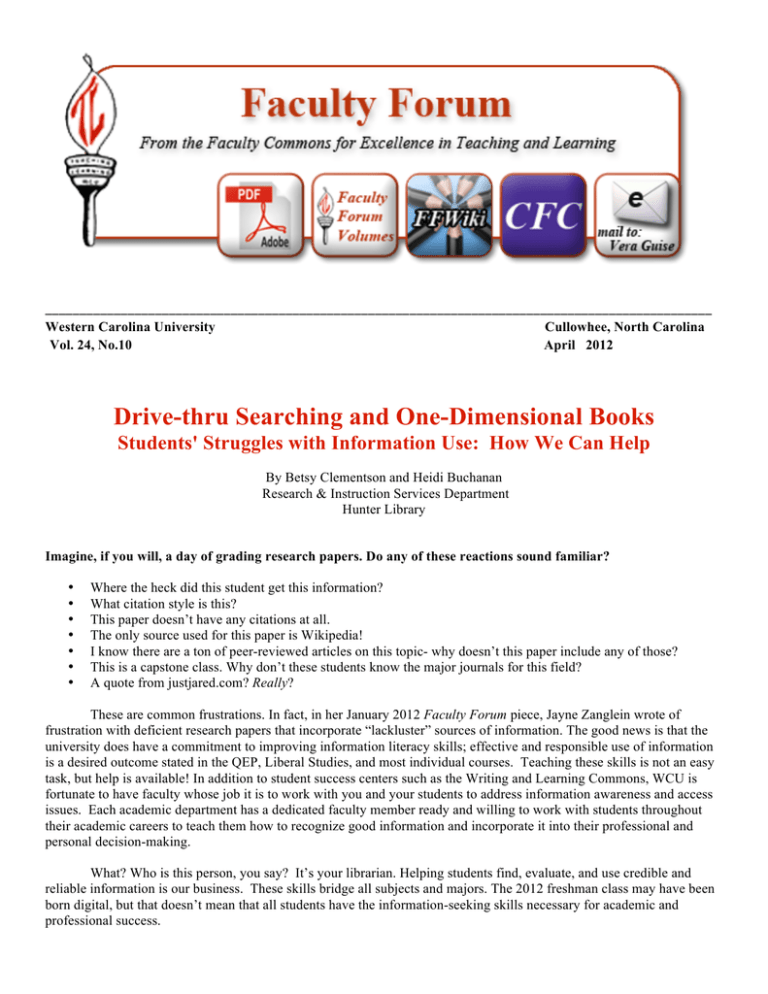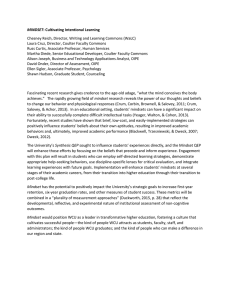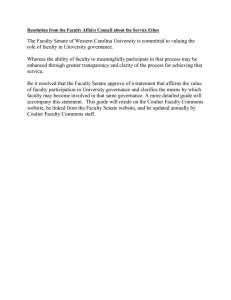Drive-thru Searching and One-Dimensional Books
advertisement

_________________________________________________________________________________________________ Western Carolina University Cullowhee, North Carolina Vol. 24, No.10 April 2012 Drive-thru Searching and One-Dimensional Books Students' Struggles with Information Use: How We Can Help By Betsy Clementson and Heidi Buchanan Research & Instruction Services Department Hunter Library Imagine, if you will, a day of grading research papers. Do any of these reactions sound familiar? • • • • • • • Where the heck did this student get this information? What citation style is this? This paper doesn’t have any citations at all. The only source used for this paper is Wikipedia! I know there are a ton of peer-reviewed articles on this topic- why doesn’t this paper include any of those? This is a capstone class. Why don’t these students know the major journals for this field? A quote from justjared.com? Really? These are common frustrations. In fact, in her January 2012 Faculty Forum piece, Jayne Zanglein wrote of frustration with deficient research papers that incorporate “lackluster” sources of information. The good news is that the university does have a commitment to improving information literacy skills; effective and responsible use of information is a desired outcome stated in the QEP, Liberal Studies, and most individual courses. Teaching these skills is not an easy task, but help is available! In addition to student success centers such as the Writing and Learning Commons, WCU is fortunate to have faculty whose job it is to work with you and your students to address information awareness and access issues. Each academic department has a dedicated faculty member ready and willing to work with students throughout their academic careers to teach them how to recognize good information and incorporate it into their professional and personal decision-making. What? Who is this person, you say? It’s your librarian. Helping students find, evaluate, and use credible and reliable information is our business. These skills bridge all subjects and majors. The 2012 freshman class may have been born digital, but that doesn’t mean that all students have the information-seeking skills necessary for academic and professional success. Who says they don’t know how to find information? They’ve been Googling since age two! Yes, most students are experienced Googlers. Finding directions to a restaurant is one thing, but how many students know that they can create a Google search to find only .gov sites? Or websites published in a certain language or region? Can they easily select the best resources when presented with a long list of varying options? Do they know where to go when they aren’t finding what they need? An ethnographic research study by academic libraries in Illinois, ERIAL, found that “…the majority of students–of all levels–who participated in this study exhibited significant difficulties that ranged across nearly every aspect of the search process” (Duke & Asher, 2012, p. 73). Project Information Literacy found much the same thing. Researchers from the Information School at the University of Washington surveyed students on 25 college campuses during the spring of 2010. Over three-fourths of the students surveyed reported difficulties defining and narrowing a topic, and filtering through irrelevant results. The report goes on to say, “Follow-up interviews suggest students lacked the research acumen for framing an inquiry in the digital age where information abounds, and intellectual discovery was paradoxically overwhelming for them” (Head & Eisenberg, p. 3). There is a difference between a search (typing words into a white box) and research, an active, iterative, and complicated process. Getting fast food at the drivethru does not make you a chef! We often make assumptions about students’ research abilities. Professors have been expert researchers for so long, that it’s often hard to imagine not being familiar with research databases and scholarly journals (Leckie, 1996). Students often struggle to evaluate resources because they do not have the same background and context that we often take for granted. Scholars use plenty of resources on a daily basis that they would never cite in a scholarly paper. Students often have misconceptions such as “all information is free online.” Though not always “free,” information is increasingly available in an online format. Plus, even though it is easier to access information, it can be difficult to decipher whether something is a journal article, a website, a review, an editorial, or even a book. Everything looks so similar on a screen. WCU is graduating future accountants, nurses, chemists, historians, teachers, lawyers, psychologists, artists, etc. The critical thinking skills acquired by learning to formulate a question, recognize the best sources of information, understand and synthesize that information, and create new knowledge are essential not only to these academic and professional pursuits, but to societal and personal endeavors as well. Do you want your health care provider to “just Google” your symptoms and go with the first answer that appears? These skills transfer to media and data literacy, too. We all need to know how to recognize commentary disguised as news, and statistics reported from studies with questionable methodology. So What Can We Do About It? All is not lost. Librarians provide instruction to more than 200 classes every year. We can swoop in at the point of need--preferably after the students have had a chance to think about their topic and do some searching on their own. However, the skills students learn in a library workshop need to be steadily reinforced throughout their academic careers. It’s a nice thought, but one visit to the gym will not make you fit for life! The same holds true for research skills. So, collaborate with your librarian. We’re here to help. We’ll work with you to craft research assignments. We’ll meet with your classes (more than once!) to plant the seeds of research wisdom. Librarians have used Wimba to meet with students half a world away, and we can do that again and again. We create research guides for subjects, concepts, and classes. The possibilities are endless, but we need your support and your willingness to give us access to your students. This partnership requires an ongoing conversation about your students’ needs and your expectations. Together we can put an end to those lackluster papers! Works Cited Duke, L. M., & Asher, A. D. (2012). College libraries and student culture: What we now know. Chicago: American Library Association. Head, A. J., & Eisenberg, M. B. (2010). Truth be told: How college students evaluate and use information in the digital age. Seattle, WA: Project Information Literacy. Retrieved from http://projectinfolit.org/pdfs/PIL_Fall2010_Survey_FullReport1.pdf Leckie, G. J. (1996). Desperately seeking citations: Uncovering faculty assumptions about the undergraduate research process. Journal of Academic Librarianship, 22(3), 201-208. ____________________ Coulter Faculty Commons for Teaching and Learning Have YOU been to Hunter Library and the Coulter Faculty Commons since our face-lift last summer? Wow! It is really upscale and looks fantastic! Are we blessed or what to have such a beautiful facility for students, faculty and staff to come read and do research? And, the new Java City is a great place to catch a cuppa cuppa, and a ray of sun at those wonderful picnic tables out on the veranda. Great addition! If you haven’t been in recently, please stop by and check us out. __________ Editorial Notes By Vera Holland Guise Faculty Fellow, Coulter Faculty Commons There has been a definite air of excitement at Western with all the special activities surrounding Dr. Belcher’s installation as our new Chancellor, and the beautiful weather has been the icing on the cake. The campus was just gorgeous for the installation ceremony yesterday and it was SO well done! Three cheers for the installation committee! It is such a joy to be a part of Western’s re-birth with a new chancellor at the helm who is a native of the south. Having grown up here in the shadow of Western (I was in 3rd grade in McKee building –then THE public school grades 1-12 when the WCU campus first began spreading off the hill!), it was a special thrill for me to witness the installation, so this was indeed a poignant experience for me. I just know the Belchers are going to be just what we need at this place in time. I was SO disappointed in the turn-out, though, and wonder what could have kept so many local folks, faculty, students and staff from sharing in this passage. Our new trial-run masthead: Still, not a whisper from any of you about it! What? PLEASE let us know what you think and don’t be afraid to make suggestions for changes. We want to get it just right before our 25th anniversary next year. Are you reading the Faculty Forum issue when it comes out every month? We hope so. We know everyone is so busy with the semester winding down and all the excitement and extra activities with a new Chancellor on board, but we urge you to read and respond; add YOUR two-bits to the dialogue, and the archives of our life and times here at Western. We want to extend a special thanks to everyone who wrote for The Faculty Forum this year. Great articles! We are now putting together our calendar for Fall 2012 semester, so please let us hear what you would like to contribute. We work very hard to publish every article that even comes close to being in line with our mission. Our goal is to serve YOU and to give YOU a venue for airing your ideas and concerns about what it means to be teaching the next generation of America’s families and workforce. In our society, we often forget that education is at least equally critical to both. Big bucks ain’t everything; let’s not let our students forget that!


